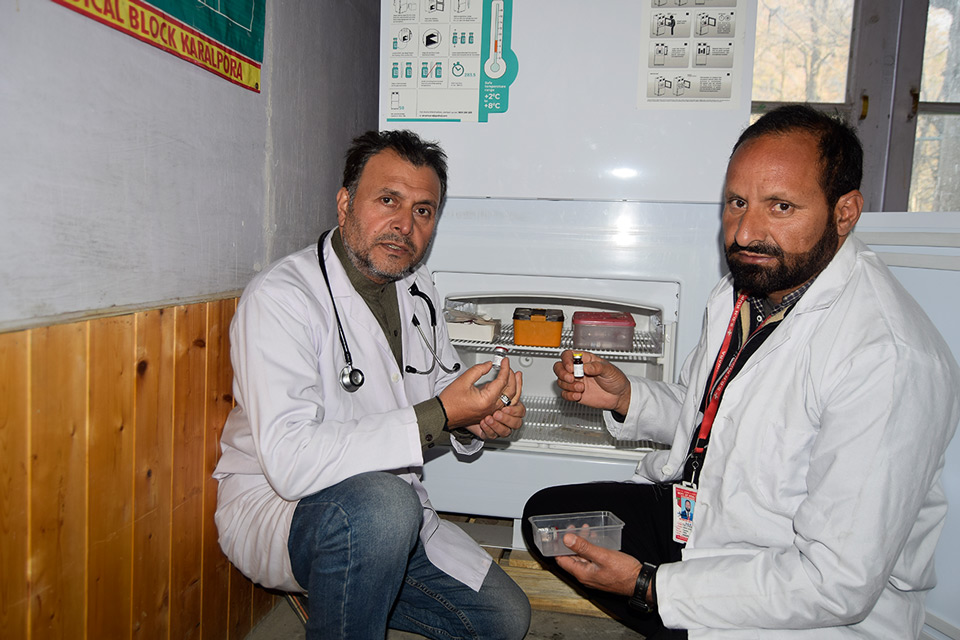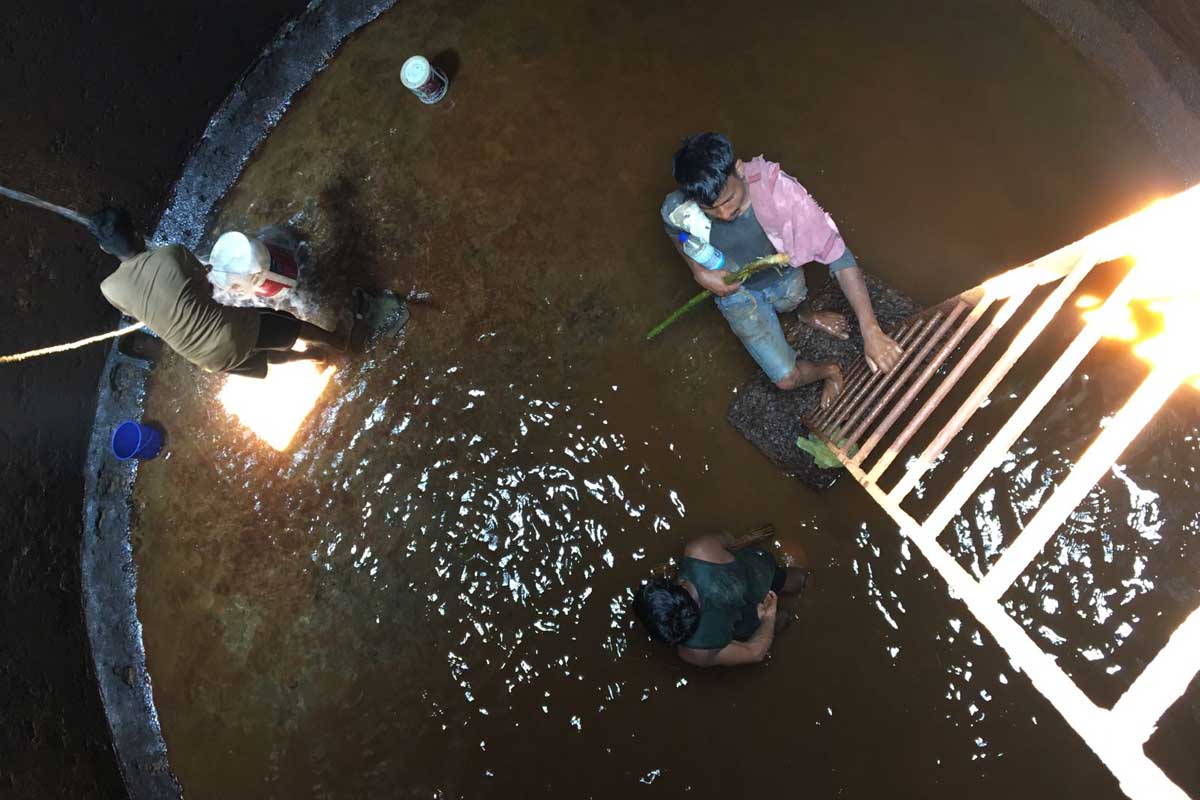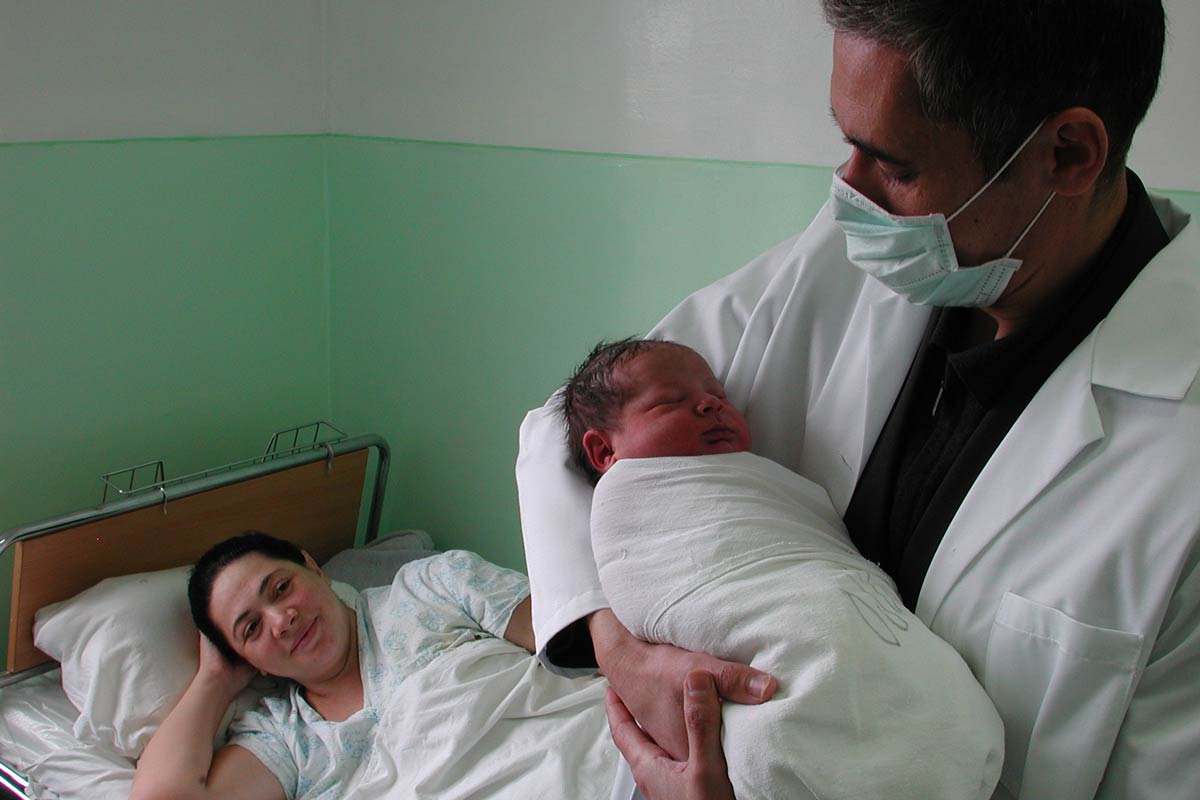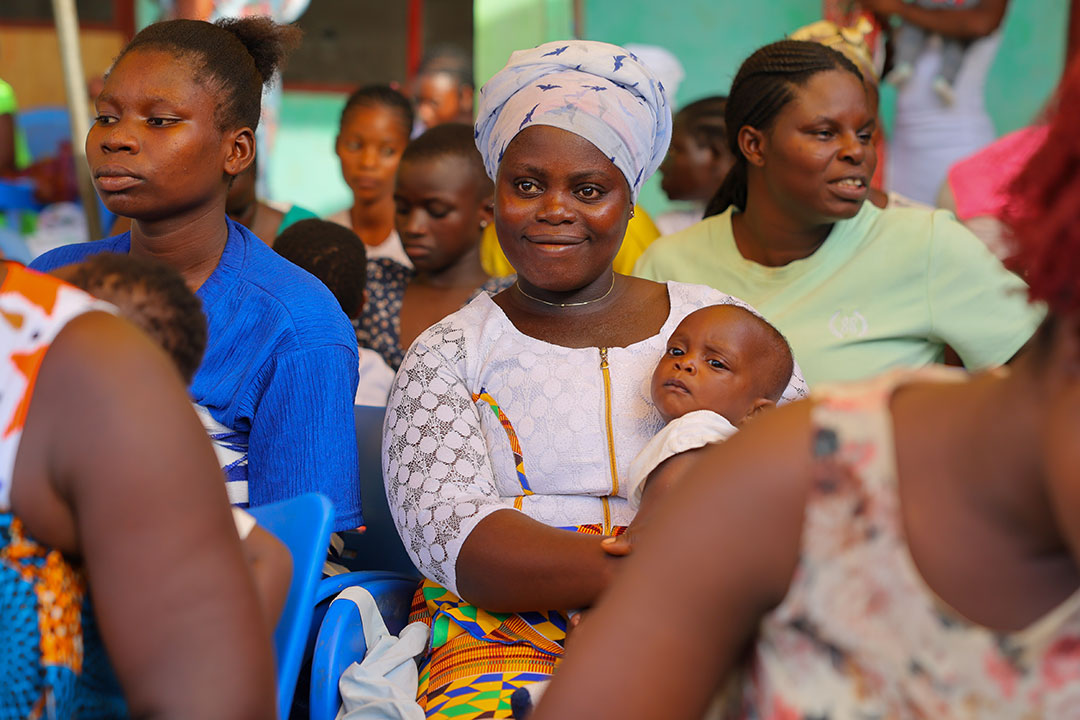Meet Bilquis Ara, one of Kashmir’s very best community health workers
At just 34, she’s belonged to India’s million-plus army of ASHA workers for a dozen years. She’s done everything from gathering health data to saving lives – and in her off-hours, she’s donated enough blood to be called “the Blood Woman of Kashmir”.
- 7 March 2024
- 8 min read
- by Nasir Yousufi
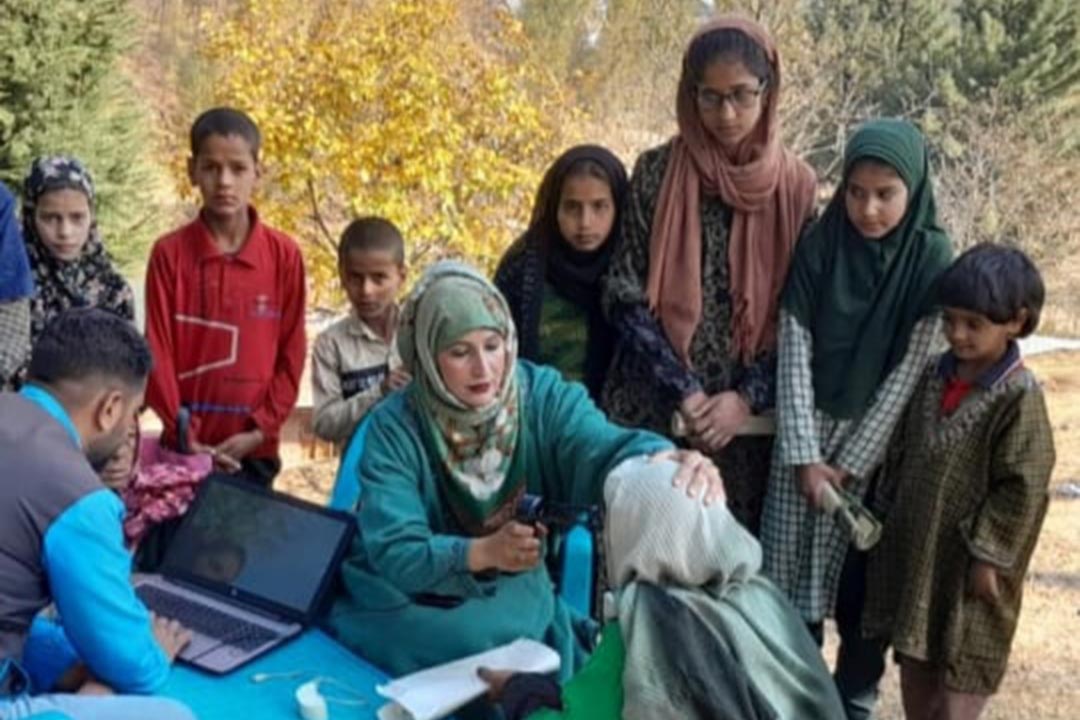
In the dead of night, an old woman knocks at the door of a village health worker and asks for a paracetamol for her pregnant daughter. Sensing – somehow – a greater risk than meets the eye, the health worker rushes to attend the patient. She checks the woman's blood pressure, and immediately sends a live location marker to the ambulance service.
In less than an hour both the patient and the accompanying health worker are arriving at the district hospital.
"Every Wednesday is immunisation day, and I have to make prior calls to every beneficiary, including pregnant mothers, informing them about their scheduled vaccination, and arranging for the vaccination of any missed-out people."
– Bilquis Ara
After an urgent caesarean section, the woman delivers a healthy child. The village health worker's finely tuned instincts and quick decision-making have saved both lives, doctors will say.
Meet Bilquis
Her name is Bilquis Ara, 34 years old, a well-known figure in Gundchobtra Langate, a frontier part of northern Kashmir. For the past 12 years, she has been serving as an Accredited Social Health Activist – commonly termed an ASHA worker – helping villagers to access basic health care schemes and services run by the government.
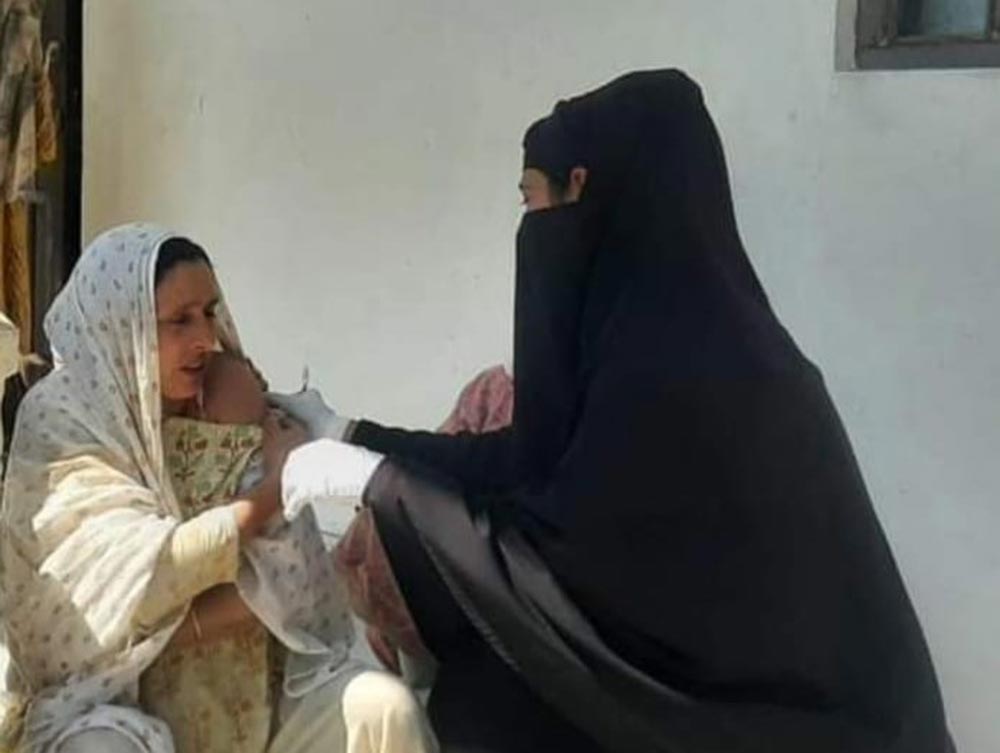
Credit: Nasir Yousufi
Bilquis's work – which ranges from first aid delivery, antenatal care, arranging ambulance services for the pregnant and needy, the distribution of sanitary napkins, to issuing health insurance cards and organising health awareness campaigns in the villages – has earned her both respect and recognition in her society.
Besides working as a community health worker, she is also a committed blood donor. The young woman has so far donated 36 pints of blood – an act that has earned her the epithet, "The Blood Woman of Kashmir".
Bilquis is also known for her motivational prowess. During the crisis years of COVID-19, the state health department nominated her as a standout campaigner against vaccine hesitancy campaigners.
Building hope
Born to a farming family, Bilquis passed her matriculation examination only after she gave birth to her first child. Now a mother of three school-going children, she has more than a decade of experience in India's million-plus women corps of ASHA workers.
"Asha" – or आशा – means "hope" in Hindi. As educators, health promoters and community mobilisers, ASHAs are the foundational agents implementing health services in the world's most populous country. ASHAs are an essential link in the chain for rolling out immunisation, delivering maternal care and promoting good health, sanitation and nutrition across the country. They also maintain health-based demographic records at village level.
The World Health Organization has recognised India's ASHA workers as Global Health Leaders. And yet, ASHA workers' aspirations have been curbed by low wages and systematically uncertain futures.
Many ASHAs, including Bilquis, draw a monthly base salary of 2,000 rupees – about US$ 24.14 – topped up with performance-based incentives. Even with those incentives, it is estimated that an average worker can hardly earn between 4,000 rupees (US$ 48) to 6,000 rupees (US$ 72)** in a village. ASHAs also contend with perennial precarity: their jobs are temporary.
Some states, like Haryana, have in recent months announced some enhancement to their wages, but many of the national corps of ASHA workers have, despite protests, not been met with shifts in government policy so far.
Still, despite challenges, many ASHA workers like Bilquis Ara have carved an indispensable niche for themselves, fuelled by passion, and strengthening the country's health system at grassroots level. Bilquis Ara was recently nominated by the district health department to a list of the best ASHAs in Kashmir.
A conversation with Bilquis, translated from Kashmiri and edited for length and clarity, follows below.
VW: You had to leave education for marriage. Briefly tell us about your early life.
BA: I was only five when my father passed away. So, I and my three siblings were raised by our mother. Alongside our schooling, my brothers and I helped our mother in tending to the fields, as agriculture was our only livelihood.
My mother helped me to receive an education up to Standard 9 from a village school. At that point, I was married. I thought, I have lost the track. But thank God, the marriage turned out to be the blessing in disguise. My husband did not only support my further studies, but also encouraged me to think beyond the four walls of the house.
Have you read?
VW: Being a mother of three children, quite busy with family chores, how did community health work become an ambition for you?
BA: It was my childhood dream to do something that makes me, my family and my community happy. While tending to my kids and living in a joint family with my in-laws, I learned that the real happiness lies in the joy of your family and the people surrounding you. To bring a smile on the people's faces is a real achievement. In 2012, when some village elders proposed my name for the ASHA from our village, my husband was quick to motivate me to grab the opportunity. This is how I became a community level worker as ASHA.
VW: How does your usual day at work as an ASHA look?
BA: Every morning, I report to the village health centre by 10am, where I help patients by facilitating their access to various government-run health schemes through on-spot registrations and enrolments. Specifically, I keep record of pregnant mothers, newborns and the adolescent girls visiting the facility – one of the main assignments of ASHAs.
In the afternoon, I go on field visits, moving door to door to collect data and distribute scheme-specific identity cards to beneficiaries, and sanitary napkins to adolescent girls.
Every Wednesday is immunisation day, and I have to make prior calls to every beneficiary, including pregnant mothers, informing them about their scheduled vaccination, and arranging for the vaccination of any missed-out people.
Every Thursday, I organise VHND [Village Health and Nutrition Day] in collaboration with ICDS [Integrated Child Development Services] at the village Anganwadi centre, to highlight the importance of balanced nutrition – particularly for pregnant women and adolescent girls.
VW: You recently won recognition as a standout ASHA worker from the State Health Department. How do you feel about that?
BA: When your work is recognised, it gives you a morale boost. I am feeling much elated that my name figured in the best ASHA list from the state. The award has motivated more ASHA workers, including my colleagues, to put extra efforts and get recognised.
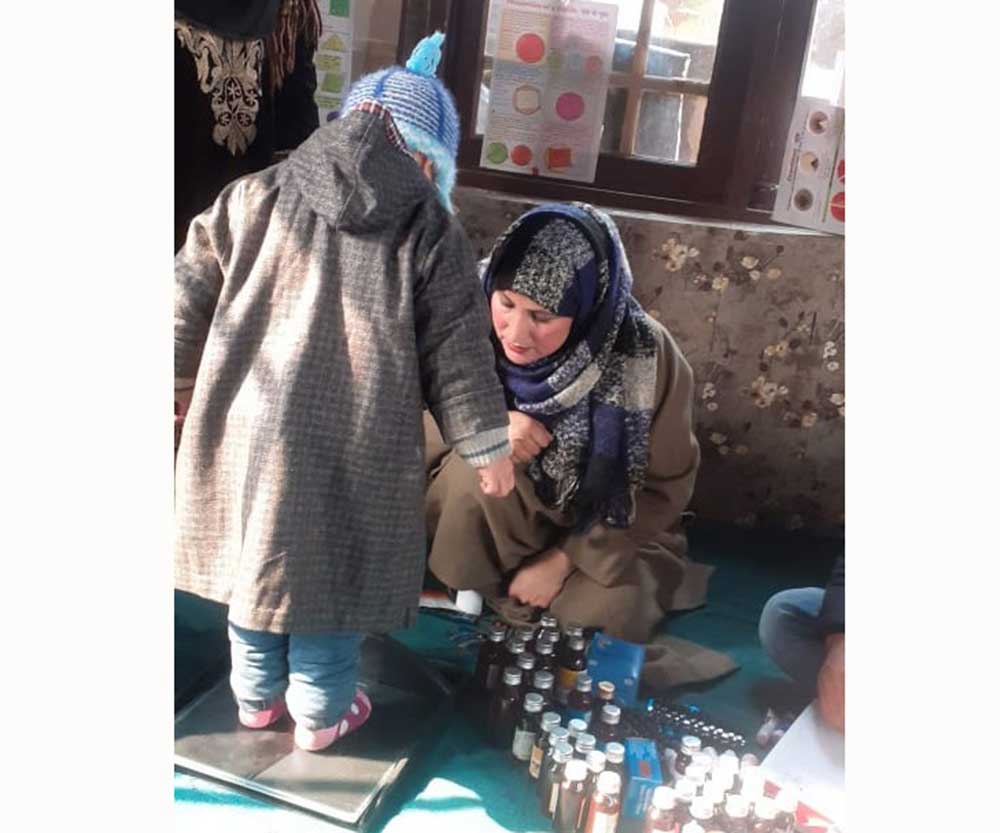
Credit: Nasir Yousufi
VW: Apart from your professional work, how have you been helping the community?
BA: In addition to my duties, I am a regular campaigner against vaccine hesitancy in rural and remote areas in the northern Kashmir. During the COVID-19 pandemic, I was one of the main campaigners motivating the people to get vaccinated across the villages in district Kupwara.
VW: You are known as "the Blood Woman of Kashmir". How did that come about?
BA: It was during 2014's devastating floods in Kashmir: I donated my first pint of blood to my two-year-old son, and donated the second pint within 24 hours to a kid battling for life in the same hospital where my son was admitted for consuming pesticide accidentally. Since then, I have never looked back. Every year, I donate three to four pints. To date, I have donated 34 pints to the needy.
Besides blood donation, I have been regularly campaigning among community members to encourage blood donation. Thank God, there are now more than 500 volunteers connected with me who readily donate blood as per the need in the district.
VW: We have recently seen many protests and strikes from ASHA workers in some parts of the country. Can you briefly tell us about your challenges and the demands?
BA: ASHA is a bridge between the Department of Health and the community. Initially we were told to give antenatal care to mother and baby only. But over the years, we have been burdened with every kind of work, ranging from collection of data to the implementation of government-run health schemes. While our days are spent in health centres and the field, our night hours are consumed in documenting the collected data.
Despite all this work, we are paid a meagre fixed amount of 2,000 rupees as a salary, and some performance-based incentives. Our jobs are insecure too, as the nature of our work is temporary. Despite spending all the precious years of life in the service of the department, many ASHAs have left the job in desperation and hopelessness.
Recent protests in some parts like Haryana have yielded some increase in the basic wages – but the enhancement still lags behind the respectable demand.
VW: Given an opportunity, what would be your suggestions to the government and policy makers to resolve the issues of ASHA workers?
BA: I think the minimum wages should be enhanced to about 18,000 rupees [US$ 217]* per month. The ASHAs should be provided digital devices and proper training to help them handle the bulk of data they deal with. Steps should be taken to regularise their services, and that is achievable if done in a phased manner.
Hope symbolises life, and we, as ASHA, have never lost it.
*Demands for ASHA wage hikes across India have ranged from about 18,000 rupees to around 26,000 rupees.
**Monthly incomes for ASHAs do vary by location. Typical city ASHA workers might earn an estimated 6,000-11,000 rupees (US$ 72–133) per month.
